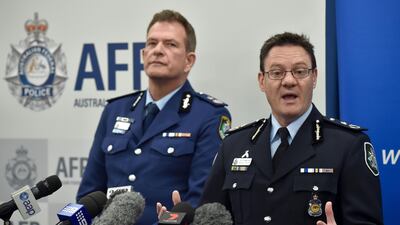The Australian government has confirmed that one of its nationals has been captured in Iraq, after reports emerged that he was detained alongside an ISIS commander central to a plot to bring down an Etihad Airways plane flying from Sydney to Abu Dhabi last year.
Australian Defence Minister Marise Payne acknowledged the detention, but would not elaborate on the identity of the male suspect.
"I can confirm advice today that an Australian is currently detained in Iraq as a result of the ongoing conflict there," Ms Payne told reporters.
But the Australian Broadcasting Corporation, citing anonymous senior Australian officials, reported those detained in Iraq earlier this year were Lebanese ISIS commander Tarek Khayat and his Australian relative Ahmed Mehri.
_________________
Read more:
Etihad Airways helps Australian police with plane attack probe
Where ISIS once thrived, beer, bingo and raki now prevail
Iraq holding 19,000 on ISIS and terrorism allegations
_________________
The arrest of the commander would represent the first arrest of an Australian national fighting for ISIS inside Iraq. One of the most notorious Australian ISIS members, Neil Prakash, was arrested trying to cross into Turkey from Syria in October 2016.
Khayat is the man believed to have directed his two brothers – Khaled and Mahmoud – to bring down an Etihad Airways flight on July 15, 2017, using a device smuggled in a meat grinder.
Australian authorities failed to detect the plot and it was only prevented by an Etihad check-in employee at Sydney airport. Police described it as one of the “most sophisticated plots that has ever been attempted on Australian soil.”
Authorities believe both Khayat and Mehri had been in touch with ISIS supporters in Australia and had played a role in several domestic plots.
The Australian government has not yet filed for the extradition of their national, but ministers have expressed a desire that he sees justice.
“We are very clear that we expect those who have joined the conflict, and those who are in breach of Australian laws – and, indeed, international law – to be dealt with according to justice,” said Ms Payne.
The Etihad flight that was targeted was carrying around 400 passengers, of which as many as 120 were Lebanese.
The explosive device never boarded the flight, as the plot was aborted at the airport. Khaled and Mahmoud Khayat allegedly organised the plot so that the devices were placed inside the hand luggage of a third brother, Amer.
Lebanese authorities had already sought the arrest of the man allegedly directing the plot, Tarek Khayat, as he had attempted to establish an ISIS affiliate in the country’s north in 2014 before he moved to Syria to join the group’s ranks.
As well as directing and inspiring local, individual attacks, ISIS has focused its attention on high-profile aviation plots. In October 2015, it brought down a Russian airliner over Egypt’s Sinai Peninsula by hiding explosives inside a can. The attack killed more than 200 people onboard.
The US and UK introduced new airline security measures in 2017 because of intelligence that revealed ISIS had plans to hide explosives inside laptops to bring down an airliner.
ISIS militants have launched attacks on airport terminals on land side, too. In 2016, members of the group detonated suicide bomb devices at Brussels airport and Istanbul airport.

